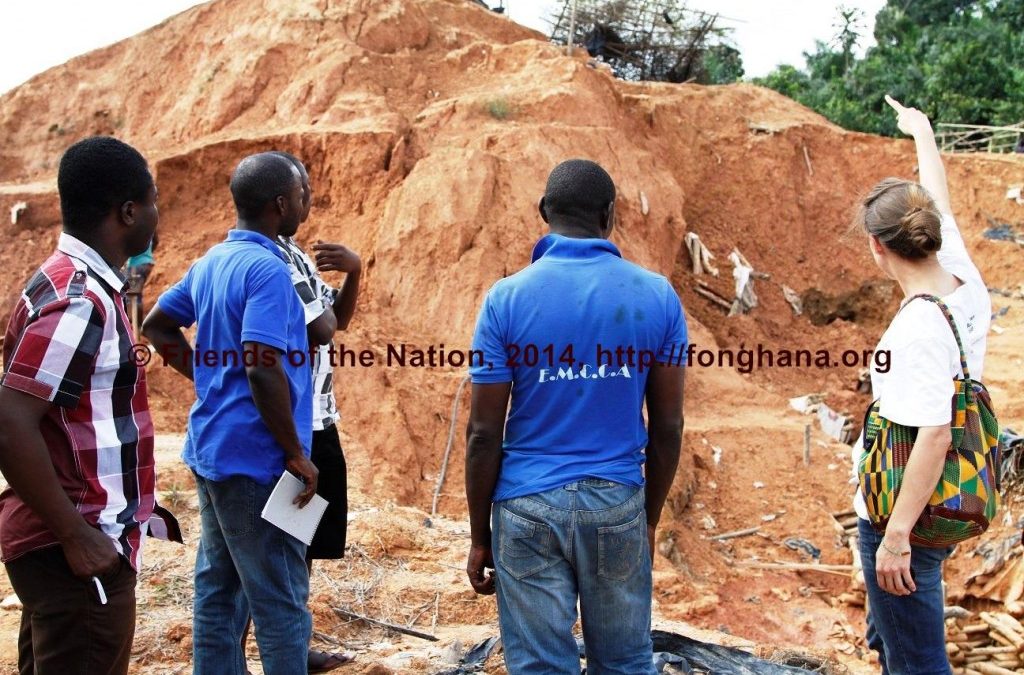Up to 1,000,000 people are involved in small-scale mining in Ghana – either legally or illegally. Illegal small-scale mining, popularly known as galamsey, is constantly featured in the media due to its pollution of rivers, destruction of forests and farmlands and safety hazards – many people die each year from mining pit collapses and drowning.
Friends of the Nation’s work in small-scale mining was boosted in April 2014 with the arrival of a volunteer researcher from Australia. We commenced an action research programme focused on investigating:
- the social and environmental impacts of small-scale mining on local communities, including health, gender, child labour, water and sanitation, and local business and development;
- the needs of miners to enhance the productivity and community development contributions of their activities and to minimise their negative environmental and social impacts;
- the impacts of and interactions between small-scale mining and other industries in the Western Region (e.g. agriculture, fisheries, and large-scale mining) to improve knowledge of the divergent perspectives on mining; and
- the perceived effectiveness and the challenges of the implementation of legislation and policies aimed at regulating small-scale mining in the Western Region, including the factors contributing to the prevalence of illegal small-scale mining in the Western Region of Ghana.
As part of this programme, we have spoken to a wide variety of stakeholders about the key issues connected to small-scale mining (both legal and illegal). The range of stakeholders includes officials at the Minerals Commission and Environmental Protection Agency (EPA), researchers from the University of Ghana in Accra and University of Mines and Technology in Tarkwa (UMaT), local government representatives, traditional authorities, representatives from the National Association of Small Scale Miners, large-scale mining companies, illegal miners, and other civil society organisations (CSOs) working in small-scale mining.
Friends of the Nation has also participated in a number of events. The third UMaT Bennial International Mining and Mineral Conference in Tarkwa featured five presentations focused on different aspects of small-scale mining. The presentations discussed a wide range of issues, including the Ghanaian Government’s involvement in purchasing gold, the possibilities for ‘ethical gold’ in Ghana, the involvement of Chinese in small-scale mining and the contribution of small-scale mining to poverty reduction in Ghana.
In October, we organised a screening of the documentary ‘Gold is Here’ in collaboration with Skyy Radio and sponsored by MTN. The documentary explores the many issues associated with galamsey, including the cycle of poverty that drives school-aged children to become involved in mining. The screening included an engaging panel discussion with the filmmaker, traditional authorities and our own Extractives Industries Program Officer.
We participated in the 5th Annual Civil Society Review of the Natural Resources and Environment Sector, organised by the KASA Initiative, and expressed our recommendations for government in terms of the small-scale mining sector. These included:
- Strengthening the capacity of regulatory agencies such as the EPA and Minerals Commission District Offices to provide effective monitoring and technical support to small-scale miners.;
- Resourcing and developing the capacity of the District Small-Scale Mining Committee to effectively monitor, promote and develop mining operations in designated areas.
- Committing to formalising small-scale mining (through the decentralisation of licensing processes and demarcation of viable lands for small-scale mining). Specifically, empowering District Officers to issue small-scale mining licenses.
- Enhancing the capacity of the small-scale miners to help them improve their environmental footprint and reduce the negative health impacts associated with their operations.
So far, our research shows that small-scale mining can be an important source of livelihoods for many local communities in Ghana. However, there are numerous negative issues associated with the practice that require attention, such as use of the toxic substance mercury to process gold, which can have devastating consequences on human health and particularly children and pregnant women. Having learnt about different ways of processing gold without using mercury, and seen this in practice, we are working towards promoting environmentally friendly processing of gold. Recently, as we documented here, Ghana has signed the Minamata Convention on Mercury, which is a first step towards ratifying the Convention and implementing strategies to reduce mercury use and releases to the environment.
Along with our advocacy, we are also developing more localised programmes focused on small-scale mining – we’re particularly interested in how we can assist youth and women involved in galamsey through training on diversified livelihoods and entrepreneurship – so stay connected for further updates on our small-scale mining program of work.

